#martie blair
Text
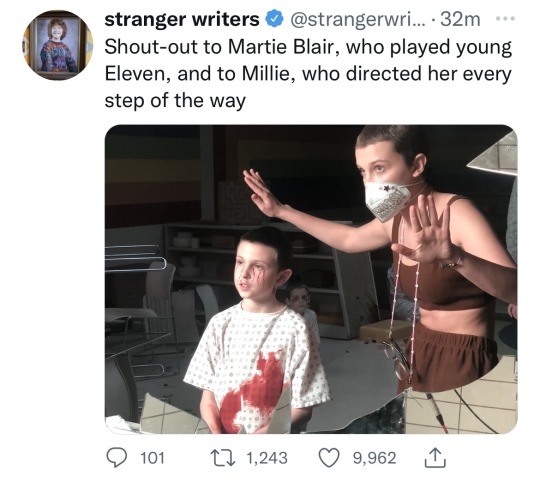
12K notes
·
View notes
Text
I love how they had Millie Bobby Brown direct the actress who played young Eleven!!!! That was such an amazing decision and Millie is such a incredibly talented person!



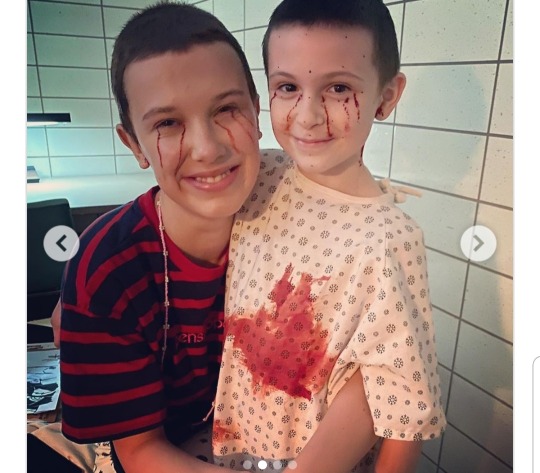
#stranger things#stranger things cast#stranger things season 4#millie bobby brown#martie blair#el#eleven#el hopper#jane hopper#netflix#the stranger six#the party
15 notes
·
View notes
Text
The true post-cyberpunk hero is a noir forensic accountant

I'm touring my new, nationally bestselling novel The Bezzle! Catch me in TOMORROW (Apr 17) in CHICAGO, then Torino (Apr 21) Marin County (Apr 27), Winnipeg (May 2), Calgary (May 3), Vancouver (May 4), and beyond!

I was reared on cyberpunk fiction, I ended up spending 25 years at my EFF day-job working at the weird edge of tech and human rights, even as I wrote sf that tried to fuse my love of cyberpunk with my urgent, lifelong struggle over who computers do things for and who they do them to.
That makes me an official "post-cyberpunk" writer (TM). Don't take my word for it: I'm in the canon:
https://tachyonpublications.com/product/rewired-the-post-cyberpunk-anthology-2/
One of the editors of that "post-cyberpunk" anthology was John Kessel, who is, not coincidentally, the first writer to expose me to the power of literary criticism to change the way I felt about a novel, both as a writer and a reader:
https://locusmag.com/2012/05/cory-doctorow-a-prose-by-any-other-name/
It was Kessel's 2004 Foundation essay, "Creating the Innocent Killer: Ender's Game, Intention, and Morality," that helped me understand litcrit. Kessel expertly surfaces the subtext of Card's Ender's Game and connects it to Card's politics. In so doing, he completely reframed how I felt about a book I'd read several times and had considered a favorite:
https://johnjosephkessel.wixsite.com/kessel-website/creating-the-innocent-killer
This is a head-spinning experience for a reader, but it's even wilder to experience it as a writer. Thankfully, the majority of literary criticism about my work has been positive, but even then, discovering something that's clearly present in one of my novels, but which I didn't consciously include, is a (very pleasant!) mind-fuck.
A recent example: Blair Fix's review of my 2023 novel Red Team Blues which he calls "an anti-finance finance thriller":
https://economicsfromthetopdown.com/2023/05/13/red-team-blues-cory-doctorows-anti-finance-thriller/
Fix – a radical economist – perfectly captures the correspondence between my hero, the forensic accountant Martin Hench, and the heroes of noir detective novels. Namely, that a noir detective is a kind of unlicensed policeman, going to the places the cops can't go, asking the questions the cops can't ask, and thus solving the crimes the cops can't solve. What makes this noir is what happens next: the private dick realizes that these were places the cops didn't want to go, questions the cops didn't want to ask and crimes the cops didn't want to solve ("It's Chinatown, Jake").
Marty Hench – a forensic accountant who finds the money that has been disappeared through the cells in cleverly constructed spreadsheets – is an unlicensed tax inspector. He's finding the money the IRS can't find – only to be reminded, time and again, that this is money the IRS chooses not to find.
This is how the tax authorities work, after all. Anyone who followed the coverage of the big finance leaks knows that the most shocking revelation they contain is how stupid the ruses of the ultra-wealthy are. The IRS could prevent that tax-fraud, they just choose not to. Not for nothing, I call the Martin Hench books "Panama Papers fanfic."
I've read plenty of noir fiction and I'm a long-term finance-leaks obsessive, but until I read Fix's article, it never occurred to me that a forensic accountant was actually squarely within the noir tradition. Hench's perfect noir fit is either a happy accident or the result of a subconscious intuition that I didn't know I had until Fix put his finger on it.
The second Hench novel is The Bezzle. It's been out since February, and I'm still touring with it (Chicago tonight! Then Turin, Marin County, Winnipeg, Calgary, Vancouver, etc). It's paying off – the book's a national bestseller.
Writing in his newsletter, Henry Farrell connects Fix's observation to one of his own, about the nature of "hackers" and their role in cyberpunk (and post-cyberpunk) fiction:
https://www.programmablemutter.com/p/the-accountant-as-cyberpunk-hero
Farrell cites Bruce Schneier's 2023 book, A Hacker’s Mind: How the Powerful Bend Society’s Rules and How to Bend Them Back:
https://pluralistic.net/2023/02/06/trickster-makes-the-world/
Schneier, a security expert, broadens the category of "hacker" to include anyone who studies systems with an eye to finding and exploiting their defects. Under this definition, the more fearsome hackers are "working for a hedge fund, finding a loophole in financial regulations that lets her siphon extra profits out of the system." Hackers work in corporate offices, or as government lobbyists.
As Henry says, hacking isn't intrinsically countercultural ("Most of the hacking you might care about is done by boring seeming people in boring seeming clothes"). Hacking reinforces – rather than undermining power asymmetries ("The rich have far more resources to figure out how to gimmick the rules"). We are mostly not the hackers – we are the hacked.
For Henry, Marty Hench is a hacker (the rare hacker that works for the good guys), even though "he doesn’t wear mirrorshades or get wasted chatting to bartenders with Soviet military-surplus mechanical arms." He's a gun for hire, that most traditional of cyberpunk heroes, and while he doesn't stand against the system, he's not for it, either.
Henry's pinning down something I've been circling around for nearly 30 years: the idea that though "the street finds its own use for things," Wall Street and Madison Avenue are among the streets that might find those uses:
https://craphound.com/nonfic/street.html
Henry also connects Martin Hench to Marcus Yallow, the hero of my YA Little Brother series. I have tried to make this connection myself, opining that while Marcus is a character who is fighting to save an internet that he loves, Marty is living in the ashes of the internet he lost:
https://pluralistic.net/2023/05/07/dont-curb-your-enthusiasm/
But Henry's Marty-as-hacker notion surfaces a far more interesting connection between the two characters. Marcus is a vehicle for conveying the excitement and power of hacking to young readers, while Marty is a vessel for older readers who know the stark terror of being hacked, by the sadistic wolves who're coming for all of us:
https://www.youtube.com/watch?v=I44L1pzi4gk
Both Marcus and Marty are explainers, as am I. Some people say that exposition makes for bad narrative. Those people are wrong:
https://maryrobinettekowal.com/journal/my-favorite-bit/my-favorite-bit-cory-doctorow-talks-about-the-bezzle/
"Explaining" makes for great fiction. As Maria Farrell writes in her Crooked Timber review of The Bezzle, the secret sauce of some of the best novels is "information about how things work. Things like locks, rifles, security systems":
https://crookedtimber.org/2024/03/06/the-bezzle/
Where these things are integrated into the story's "reason and urgency," they become "specialist knowledge [that] cuts new paths to move through the world." Hacking, in other words.
This is a theme Paul Di Filippo picked up on in his review of The Bezzle for Locus:
https://locusmag.com/2024/04/paul-di-filippo-reviews-the-bezzle-by-cory-doctorow/
Heinlein was always known—and always came across in his writings—as The Man Who Knew How the World Worked. Doctorow delivers the same sense of putting yourself in the hands of a fellow who has peered behind Oz’s curtain. When he fills you in lucidly about some arcane bit of economics or computer tech or social media scam, you feel, first, that you understand it completely and, second, that you can trust Doctorow’s analysis and insights.
Knowledge is power, and so expository fiction that delivers news you can use is novel that makes you more powerful – powerful enough to resist the hackers who want to hack you.
Henry and I were both friends of Aaron Swartz, and the Little Brother books are closely connected to Aaron, who helped me with Homeland, the second volume, and wrote a great afterword for it (Schneier wrote an afterword for the first book). That book – and Aaron's afterword – has radicalized a gratifying number of principled technologists. I know, because I meet them when I tour, and because they send me emails. I like to think that these hackers are part of Aaron's legacy.
Henry argues that the Hench books are "purpose-designed to inspire a thousand Max Schrems – people who are probably past their teenage years, have some grounding in the relevant professions, and really want to see things change."
(Schrems is the Austrian privacy activist who, as a law student, set in motion the events that led to the passage of the EU's General Data Privacy Regulation:)
https://pluralistic.net/2020/05/15/out-here-everything-hurts/#noyb
Henry points out that William Gibson's Neuromancer doesn't mention the word "internet" – rather, Gibson coined the term cyberspace, which, as Henry says, is "more ‘capitalism’ than ‘computerized information'… If you really want to penetrate the system, you need to really grasp what money is and what it does."
Maria also wrote one of my all-time favorite reviews of Red Team Blues, also for Crooked Timber:
https://crookedtimber.org/2023/05/11/when-crypto-meant-cryptography/
In it, she compares Hench to Dickens' Bleak House, but for the modern tech world:
You put the book down feeling it’s not just a fascinating, enjoyable novel, but a document of how Silicon Valley’s very own 1% live and a teeming, energy-emitting snapshot of a critical moment on Earth.
All my life, I've written to find out what's going on in my own head. It's a remarkably effective technique. But it's only recently that I've come to appreciate that reading what other people write about my writing can reveal things that I can't see.

If you'd like an essay-formatted version of this post to read or share, here's a link to it on pluralistic.net, my surveillance-free, ad-free, tracker-free blog:
https://pluralistic.net/2024/04/17/panama-papers-fanfic/#the-1337est-h4x0rs

Image:
Frédéric Poirot (modified)
https://www.flickr.com/photos/fredarmitage/1057613629 CC BY-SA 2.0
https://creativecommons.org/licenses/by-sa/2.0/
#pluralistic#science fiction#cyberpunk#literary criticism#maria farrell#henry farrell#noir#martin hench#marty hench#red team blues#the bezzle#forensic accountants#hackers#bruce schneier#post-cyberpunk#blair fix
185 notes
·
View notes
Text
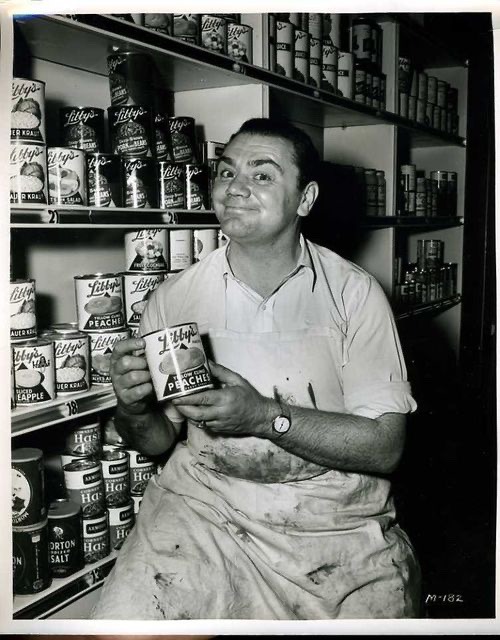

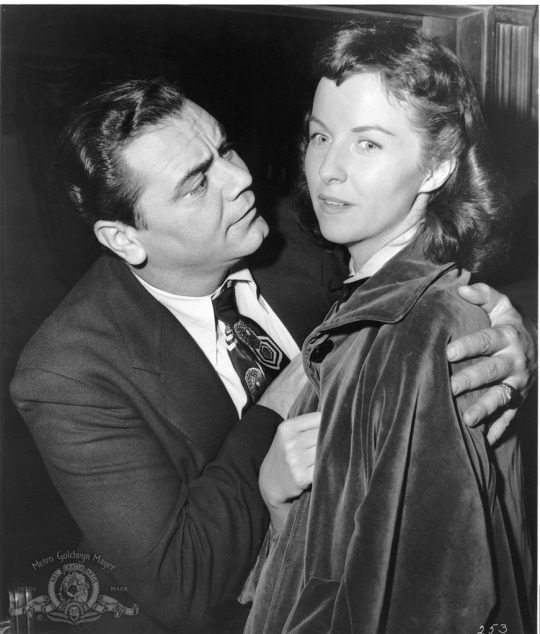

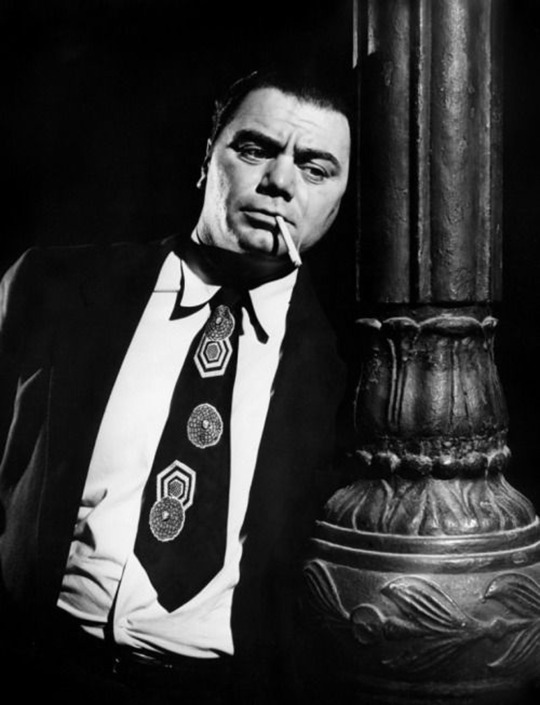
Delbert Mann’s MARTY premiered in New York City #OnThisDay in 1955. Ernest Borgnine and Betsy Blair star in the only film based on a TV production to win the Best Picture Oscar. Screenplay: Paddy Chayefsky
69 notes
·
View notes
Photo
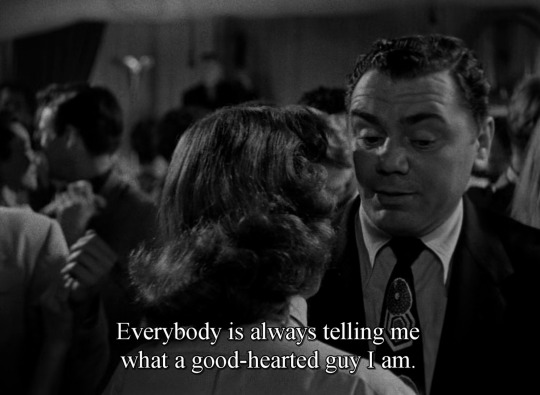
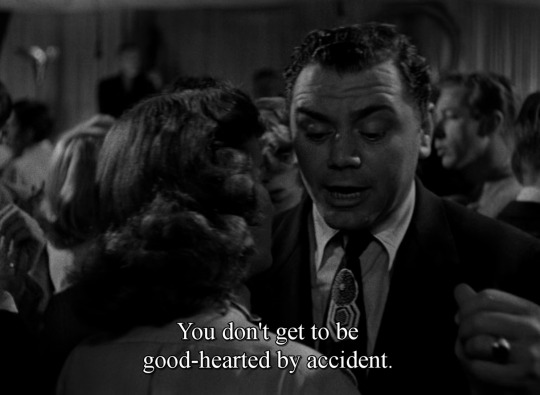

Marty (Delbert Mann, 1955)
#Marty#Delbert Mann#Ernest Borgnine#Betsy Blair#quote#pain#1955#black and white#dance#heart#sadness#hurt
350 notes
·
View notes
Text
this too, is true detective: list of requirements
southern gothic backdrop is a MUST. open, eerie fields are a bare minimum requirement, preferably with religious imagery or esoteric occult symbolism. dilapidated infrastructure, listless crowds serve as set dressing, and peripheral characters have a kind of meridional sleaze.
must have one or the other: a detective figure, preferably engaged in some form of psychosexual homoerotic partnership with a more established member of the force. the detective is more archetypal than literal, a truth seeker who’s connection to the crime is largely an exercise in thought, tied to the victims only by proximity, until it becomes all too personal. this figure must be distrusted by the majority of the ensemble, a proverbial outsider who’s behaviors and mannerisms are considered different and untrustworthy.
our other option is a violent murderer who more often than not is symbolic of a higher power. supernatural elements, specifically the unknowable cosmic horror of Cthulhu, are tied to the distinctly human motivations of sexual, power based crimes. brutality is absolutely necessary, the victims that ultimately matter are always women, crucified and debased.
corruption within the higher power. invariably, it always comes down to the police force, how this institution meant to protect often harms with impunity. if you wish to view it from a more abstract lens, the police can be a stand in for a parent, a father too preoccupied with his life’s work failing to stop the monster from crossing the threshold, the mother who welcomes him with open arms. the christ on the cross hanging in the doorway, watching the children suffer in his name.
#true detective#southern gothic#rust cohle#marty hart#twin peaks#sharp objects#cure 1997#stoker#memories of murder#blair witch
24 notes
·
View notes
Text






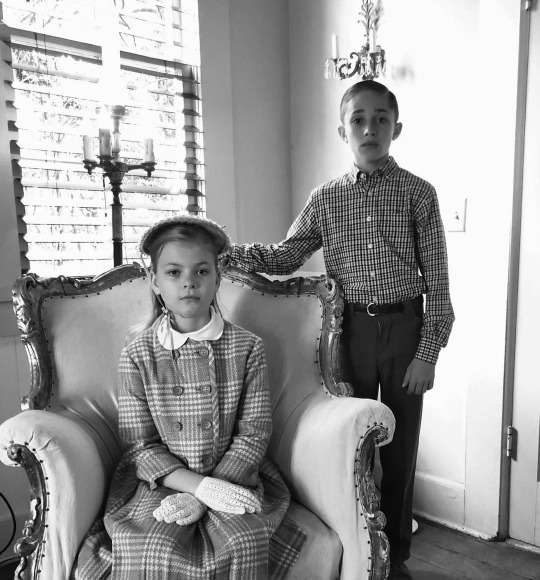

god. these spot the difference games are getting difficult 🥲
#martie marie blair#raphael luce#livy birch#jamie campbell bower#millie bobby brown#st bts#st cast#stranger things
114 notes
·
View notes
Text

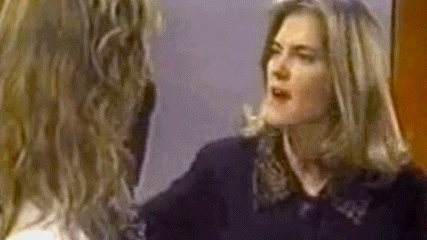



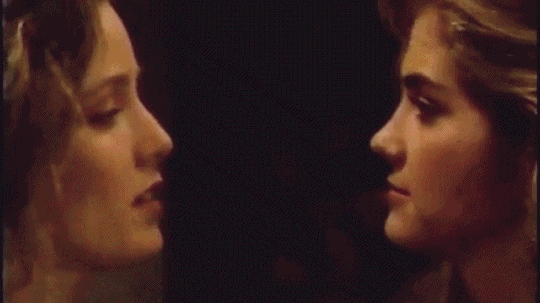


12 DAYS OF CHRISTMAS GIFSETS (KDP30)
Blair and her most worthy rival, Marty Saybrooke
10 notes
·
View notes
Text
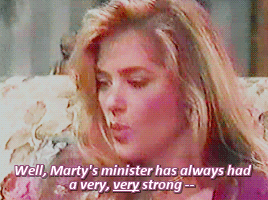
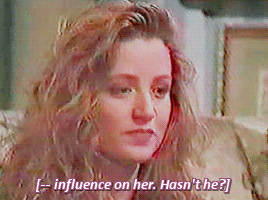
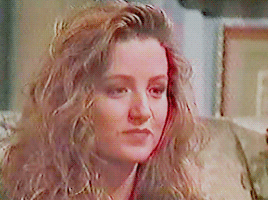

- From what I could tell, it was, um -- it was Andrew that changed her mind.
- Really?
#blair cramer#kassie depaiva#oltl#one life to live#susan haskell#marty saybrooke#blair and marty#1994#my stuff#this was my vote for the blair rivalry poll i posted a few weeks ago#and it was also the winner#i'm going to reblog the poll results with some other thoughts in a few days
10 notes
·
View notes
Text



Stranger Things Season 4: Behind The Scenes.
Martie Marie Blair is young Eleven.
#millie bobby brown#eleven#steve harrington#joe keery#martie marie blair#vecna#stranger things#behind the scenes#jamie campbell bower
38 notes
·
View notes
Photo

Betsy Blair and Ernest Borgnine in Marty (Delbert Mann, 1955)
Cast: Ernest Borgnine, Betsy Blair, Esther Minciotti, Augusta Ciolli, Joe Mantell, Karen Steele, Jerry Paris, Frank Sutton. Screenplay: Paddy Chayefsky. Cinematography: Joseph LaShelle. Art direction: Ted Haworth, Walter M. Simonds. Music: Roy Webb.
That Marty is such an engaging little movie is largely because Ernest Borgnine and Betsy Blair have such remarkable low-key chemistry together and Paddy Chayefsky's screenplay brings them together convincingly and keeps them apart smartly. Chayefsky does overdo the "what do you wanna do tonight" shtick, which kept contemporary comedians busy far too long, and the self-pitying Italian mama stereotypes of Marty's mother, Mrs. Piletti (Esther Minciotti), and Aunt Catherine (Augusta Ciolli), but it's on the whole a well-made script. Some credit is obviously due to the director, Delbert Mann, who also directed Chayefsky's 1953 teleplay on which the movie is based. It was his big-screen debut and won him an Oscar, but he never followed up with another comparable film -- his best later work was probably on two Doris Day comedies, Lover Come Back (1961) and That Touch of Mink (1962). Oscars also went to Borgnine, Chayefsky, and the film itself, and nominations to Blair, Joe Mantell as Marty's pal Angie, Joseph LaShelle's wonderfully atmospheric cinematography, and to the art directors. In fact, if Marty has any lasting claim to fame other than being a satisfying romantic drama, it's in the Academy's uncharacteristic recognition of a "little" film -- especially noticeable in the mid-50s when the prevailing Hollywood trend was to "give 'em something they can't get on television." Since they had already gotten Marty on TV two years earlier, the Oscar attention was especially surprising. It didn't signal any sort of trend, however: The following year, the best picture winner was Around the World in 80 Days (Michael Anderson), a typically bloated extravaganza loaded with movie-star cameos, and for the first time, all of the best picture nominees for 1956 were filmed in color. It was as if the Academy had said, "Fine, we did our duty, now let's get back to business."
3 notes
·
View notes
Photo


Oh my word!!! The actors who played young Eleven, Thirteen, and Nine have done a photoshoot together!! This is so sweet and pure... now I just imagine these characters being great friends!! 💗💗
#stranger things cast#stranger things#martie blair#hendrix yancey#chloe adona#el#eleven#el hopper#jane hopper#thirteen#nine#the stranger six#the party#the stranger things kids
9 notes
·
View notes
Text
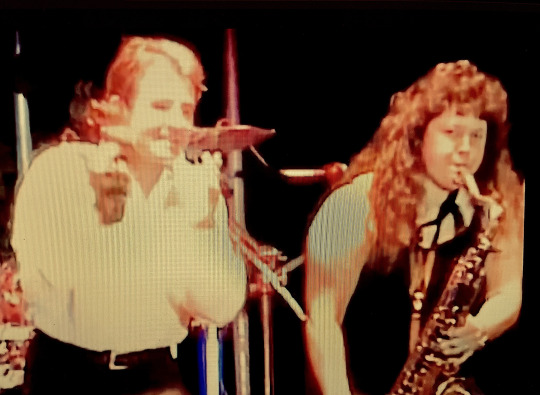


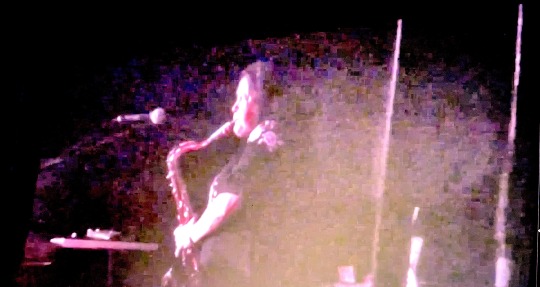
HAPPY BIRTHDAY to the fabulous saxophonist Aviva Maloney. Starting in the 80s, she was very visible as a side-woman for The Monkees + solo Davy Jones and Peter Tork. I’m blessed to have performed with her many times; she’s always professional and supportive, and I’m happy to count her as my good friend. She also released an acclaimed solo album, REED MY MIND, a smooth jazz project backed with members of The Monkees road band, Pablo Cruise, Starship and other high caliber musicians (REED MY MIND is on iTunes). Aviva has also performed with Marty Balin, Big Brother & The Holding Company, and Craig Chaquico, and she’s still performing around the greater Los Angeles area. Here she is on a Davy Jones song “My Love.” https://www.youtube.com/watch?v=UVAX_iK8NVE Meanwhile, HB AM—thank you for the years of joy you’ve played for us.
#aviva #avivamaloney #reed #davyjones #petertork #monkees #martybalin #starship #craigchaquico #saxophone #pablocruise
#Aviva#aviva maloney#reed#Davy Jones#Peter Tork#Monkees#Marty Baliun#Starship#Craig Chaquico#saxophone#Pablo Cruise#johnny j blair#music#san francisco#pop rock#monkees#davy jones
3 notes
·
View notes
Text


Delbert Mann's MARTY enjoyed its premiere in New York City on April 11, 1955 #OnThisDay
26 notes
·
View notes
Photo


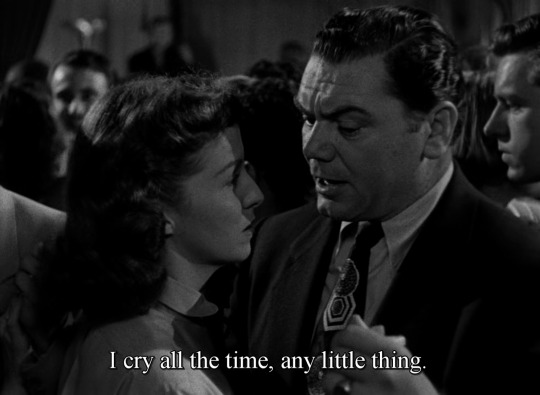
Marty (Delbert Mann, 1955)
164 notes
·
View notes
Photo
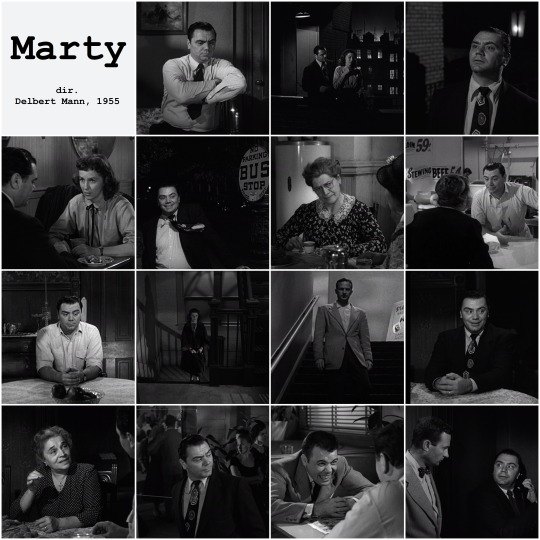
Marty
directed by Delbert Mann, 1955
#Marty#Delbert Mann#movie mosaics#Ernest Borgnine#Betsy Blair#Augusta Ciolli#Joe Mantell#Esther Minciotti#Frank Sutton
0 notes